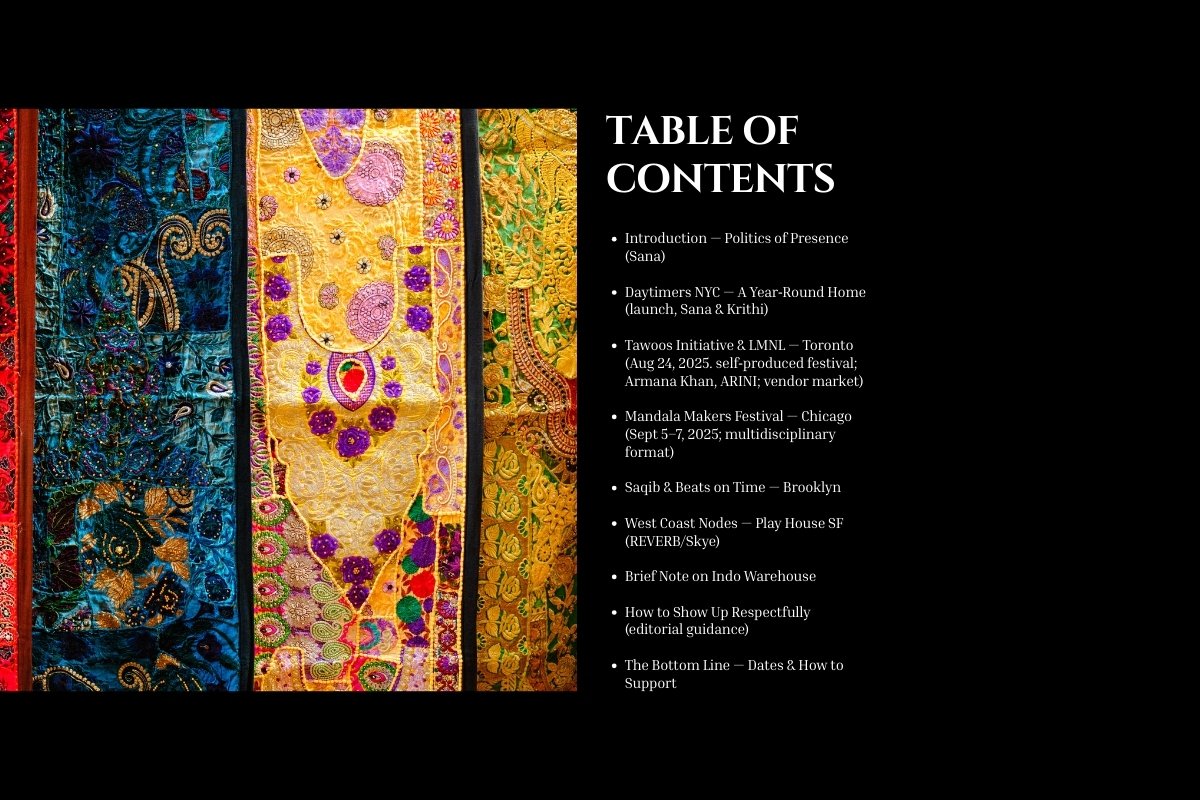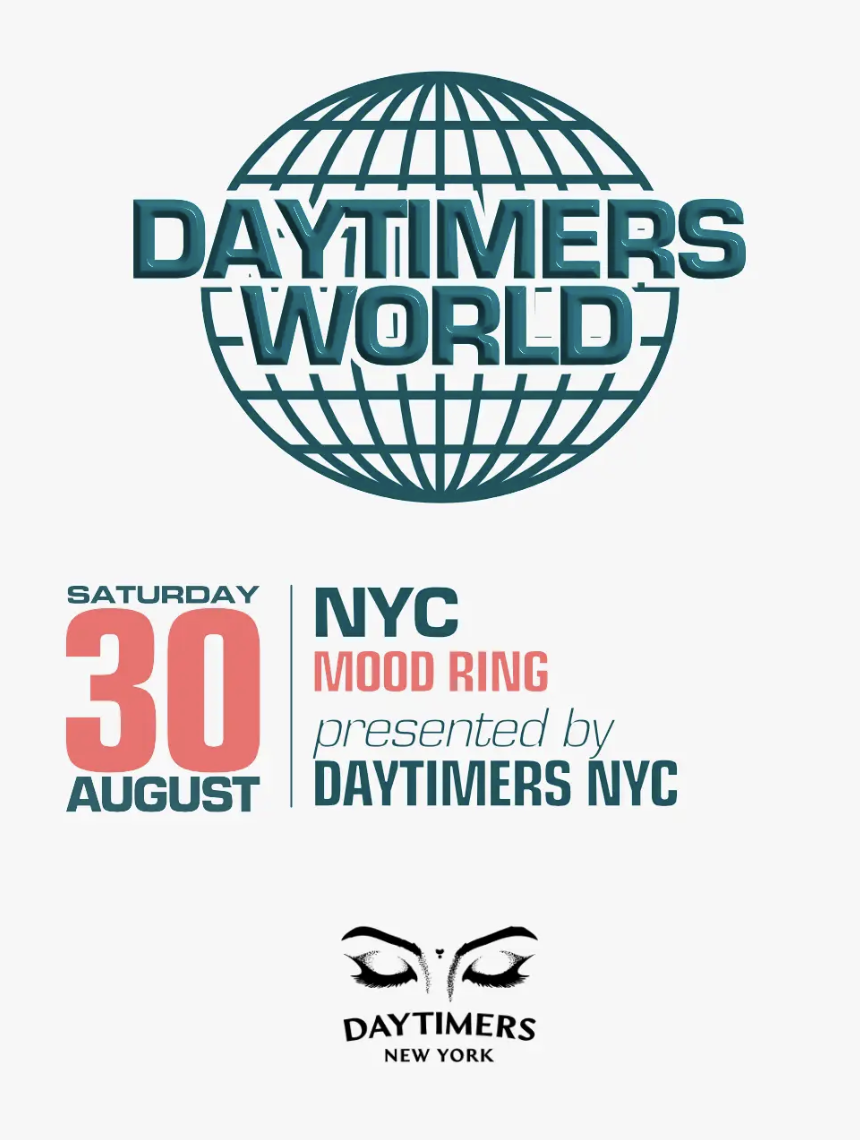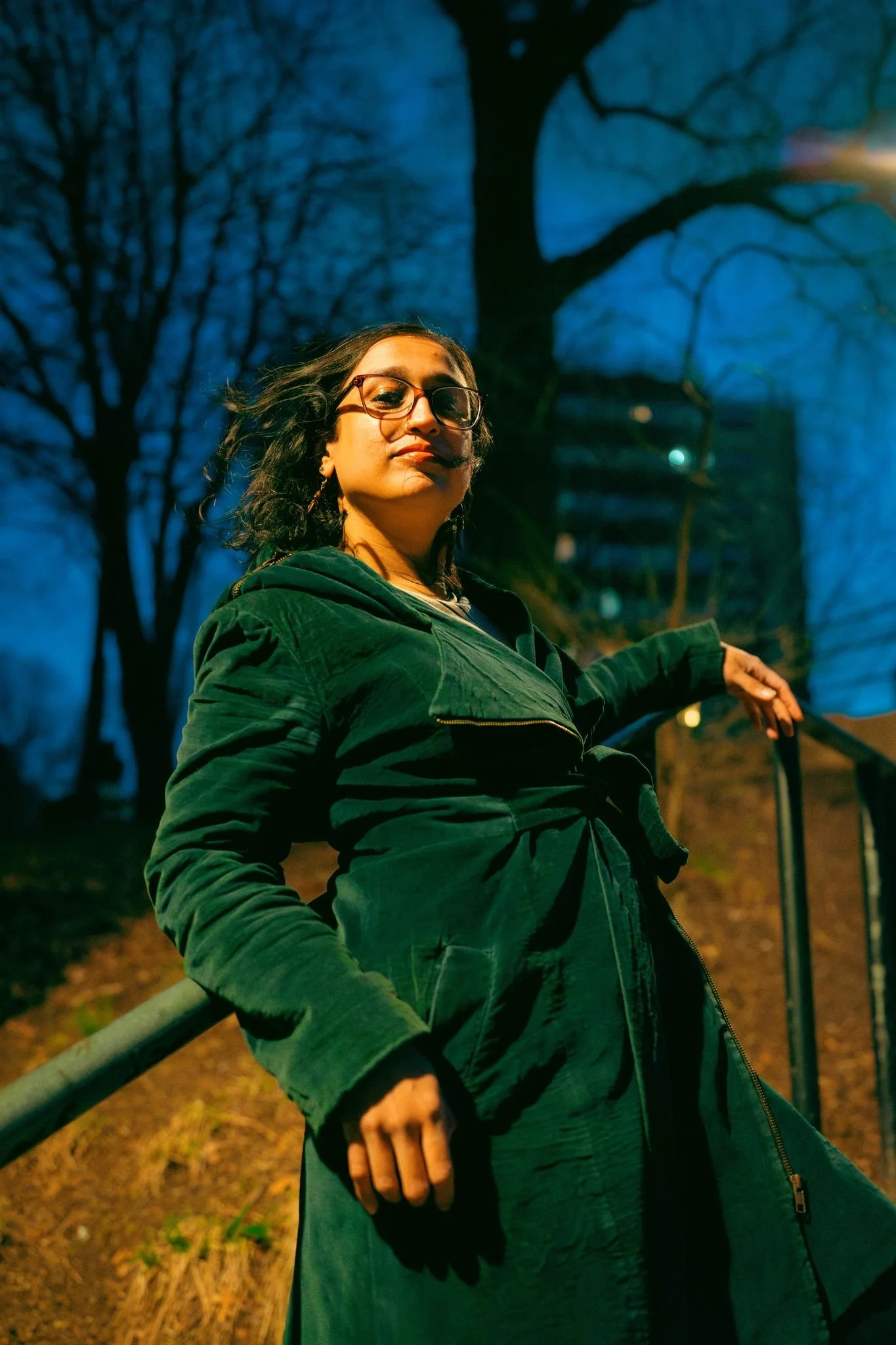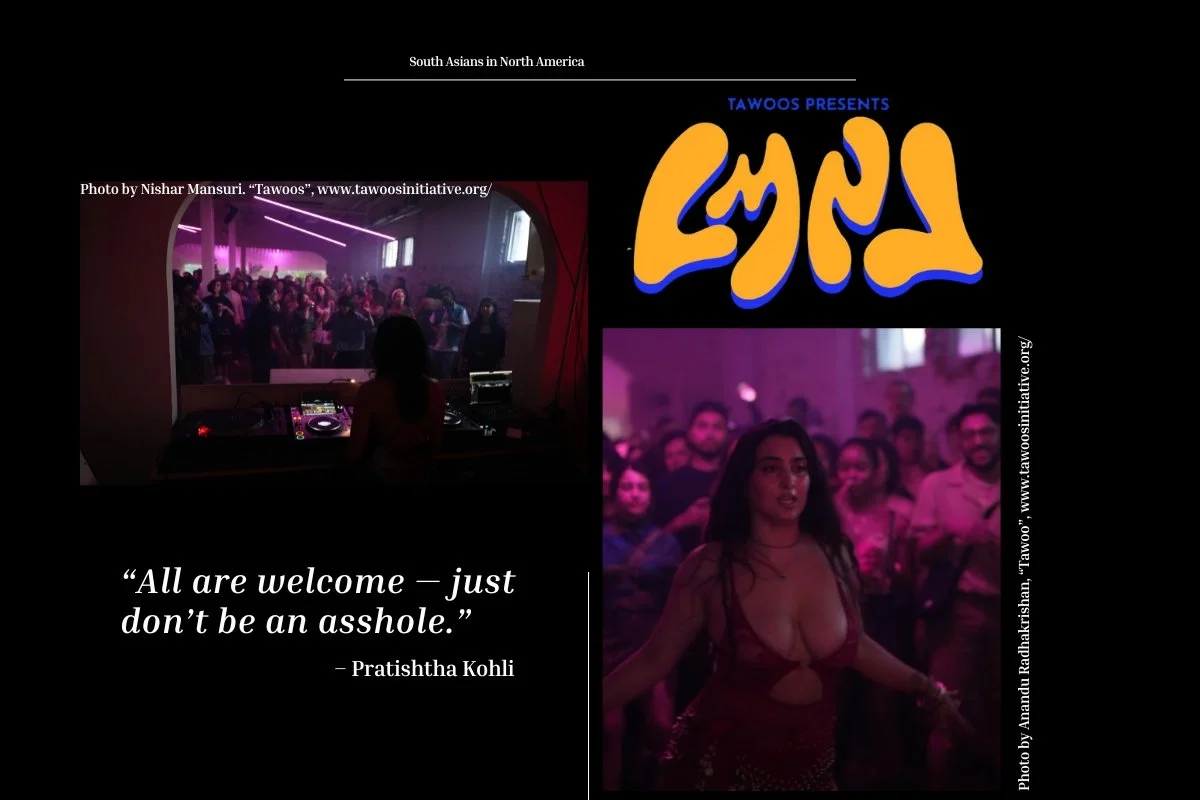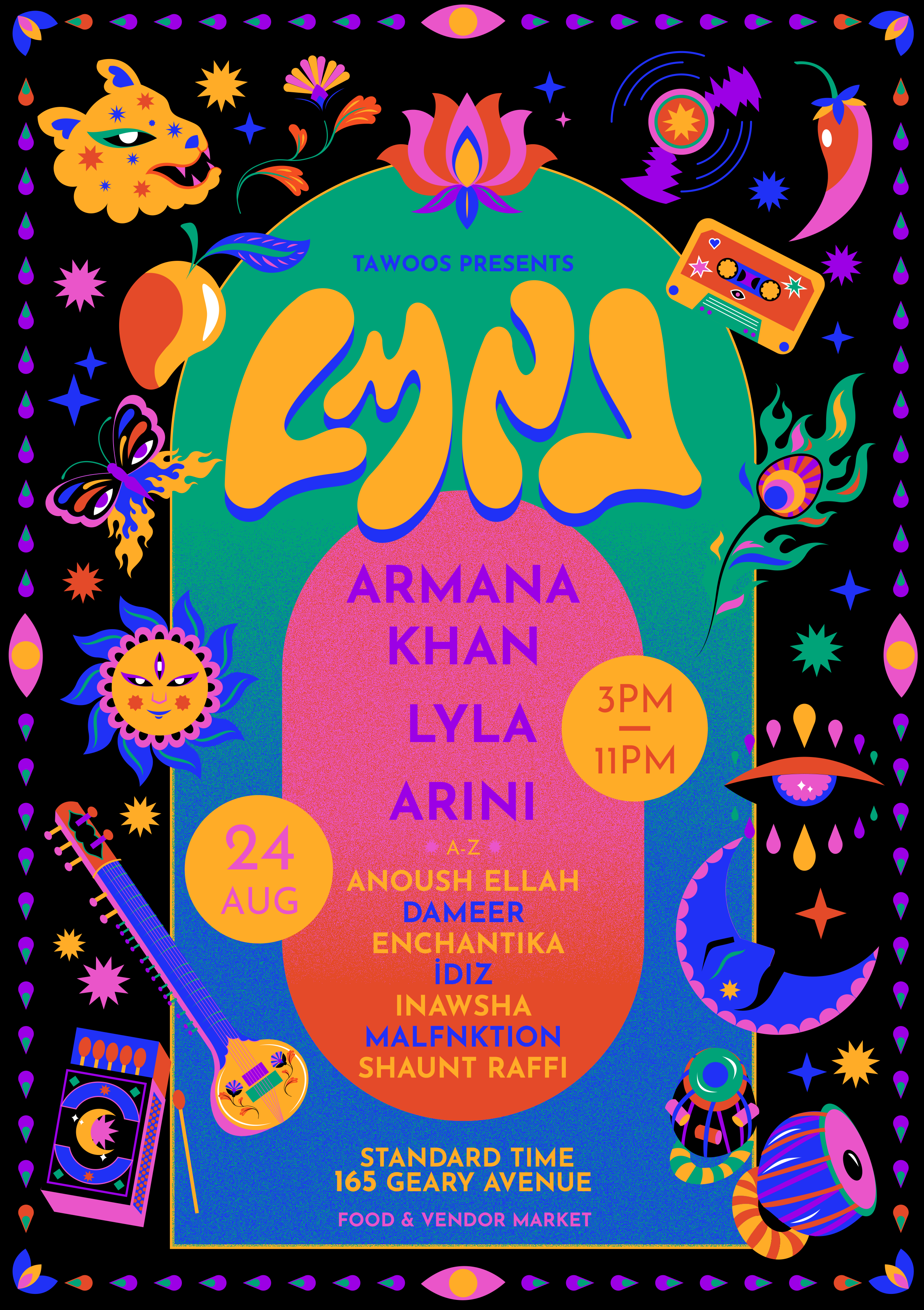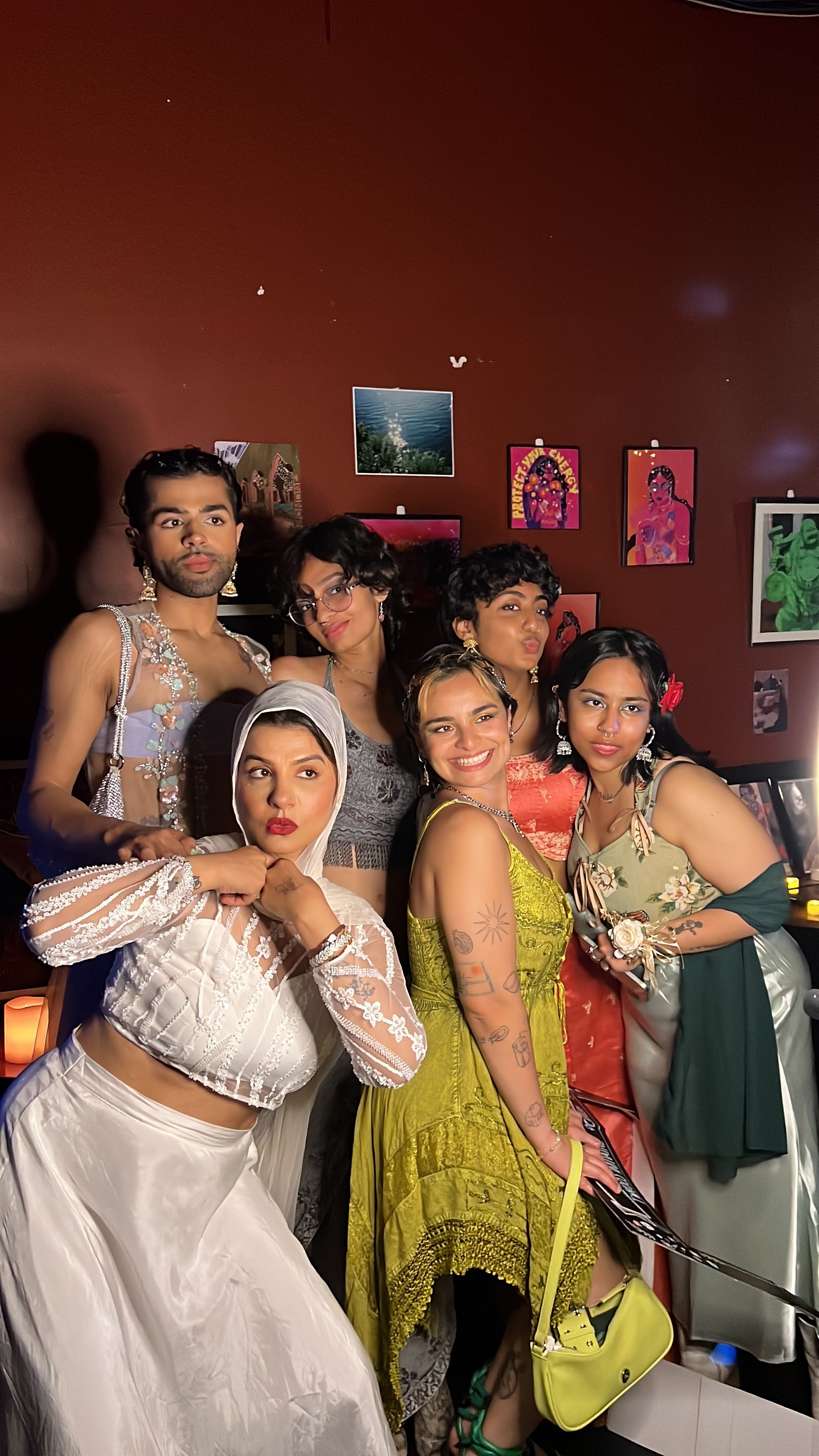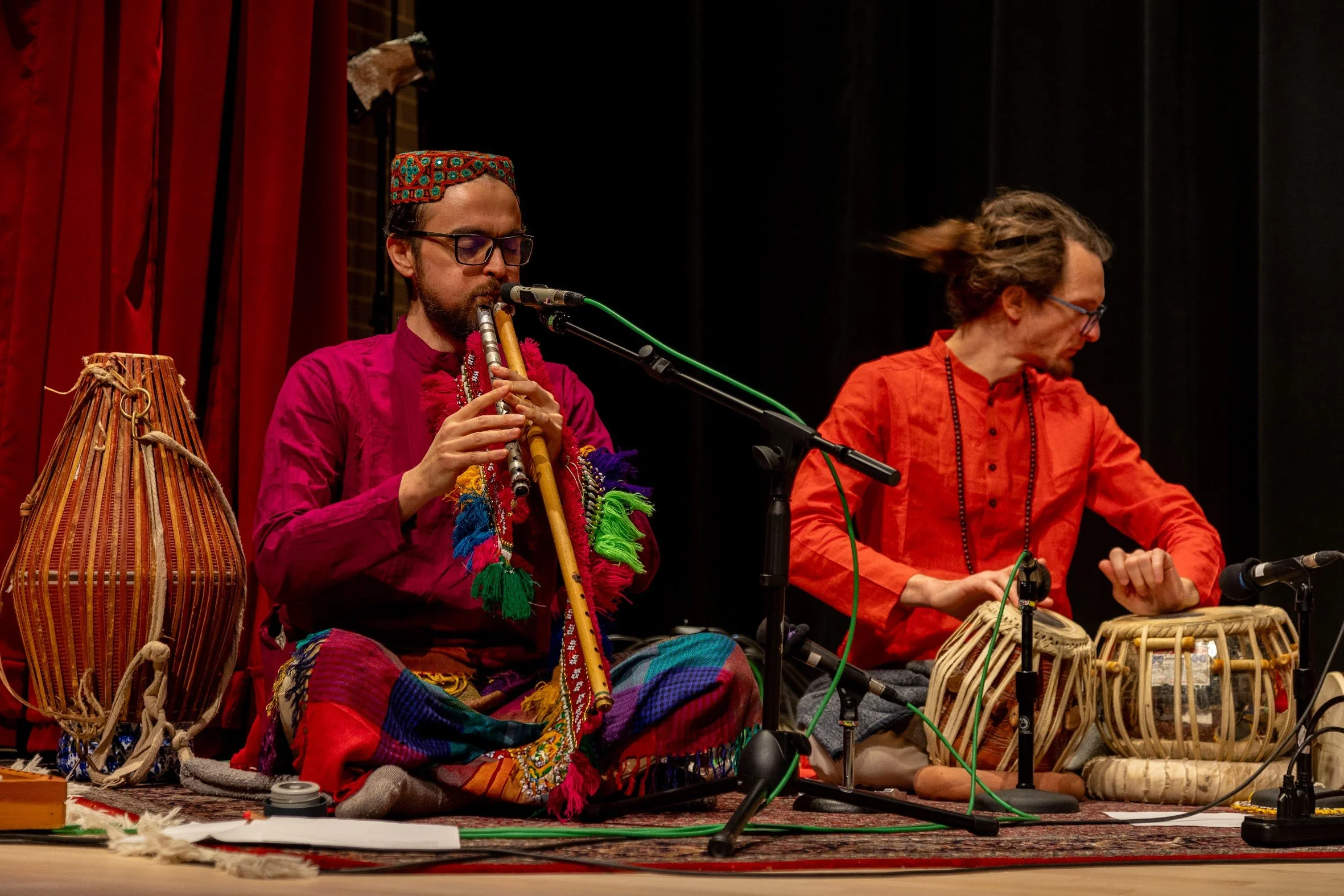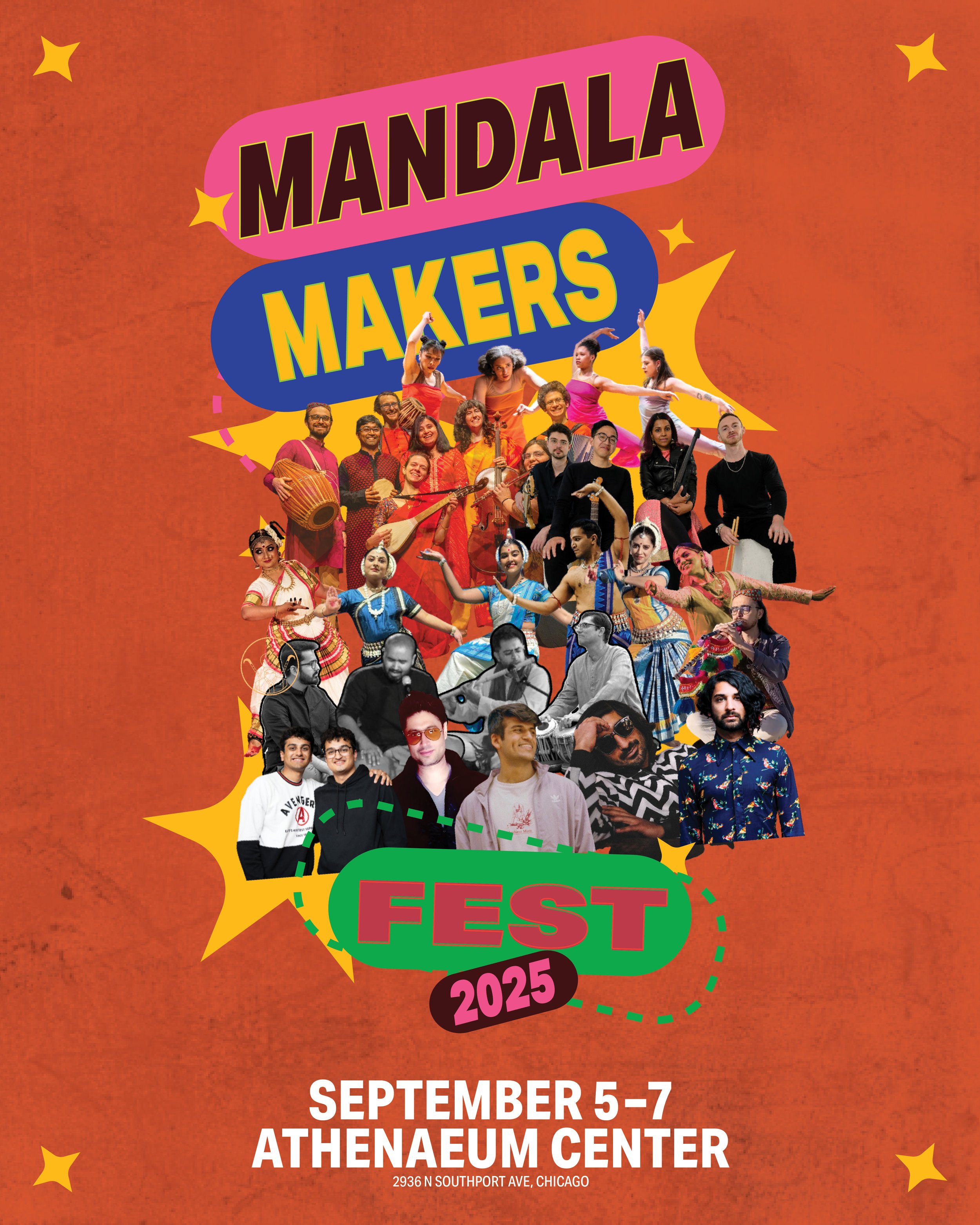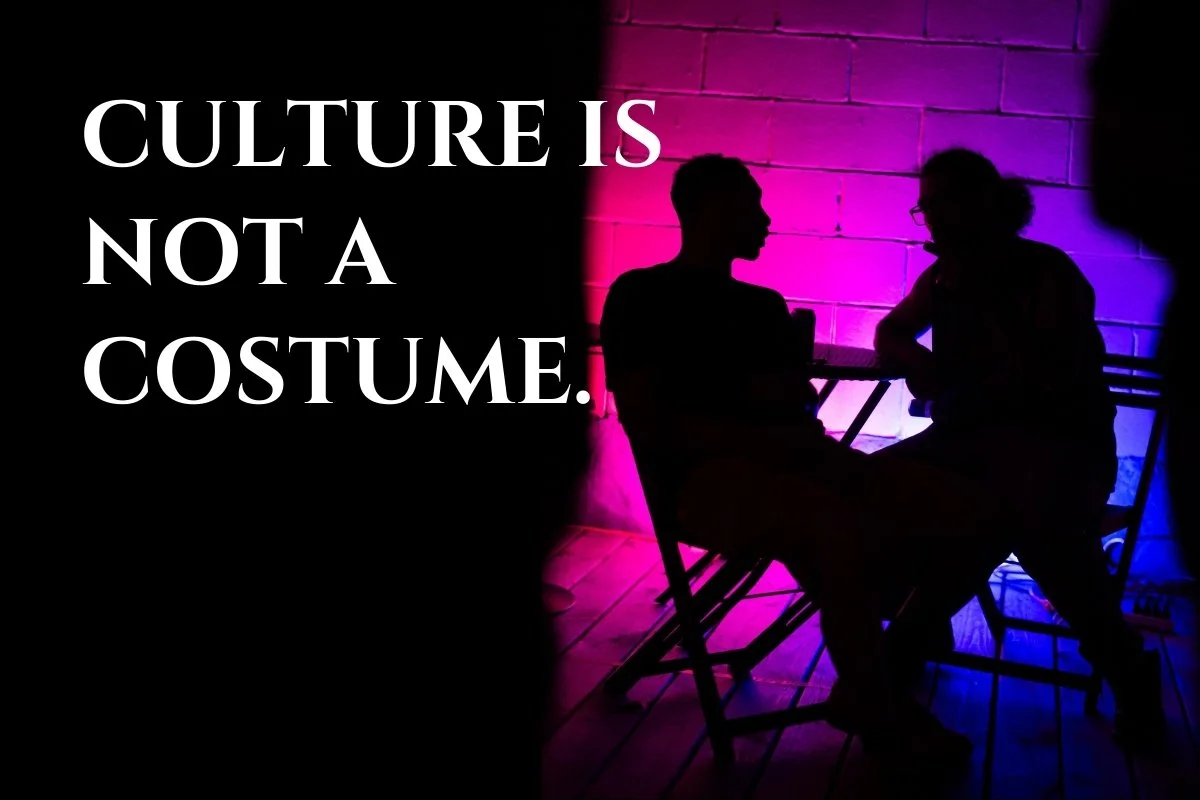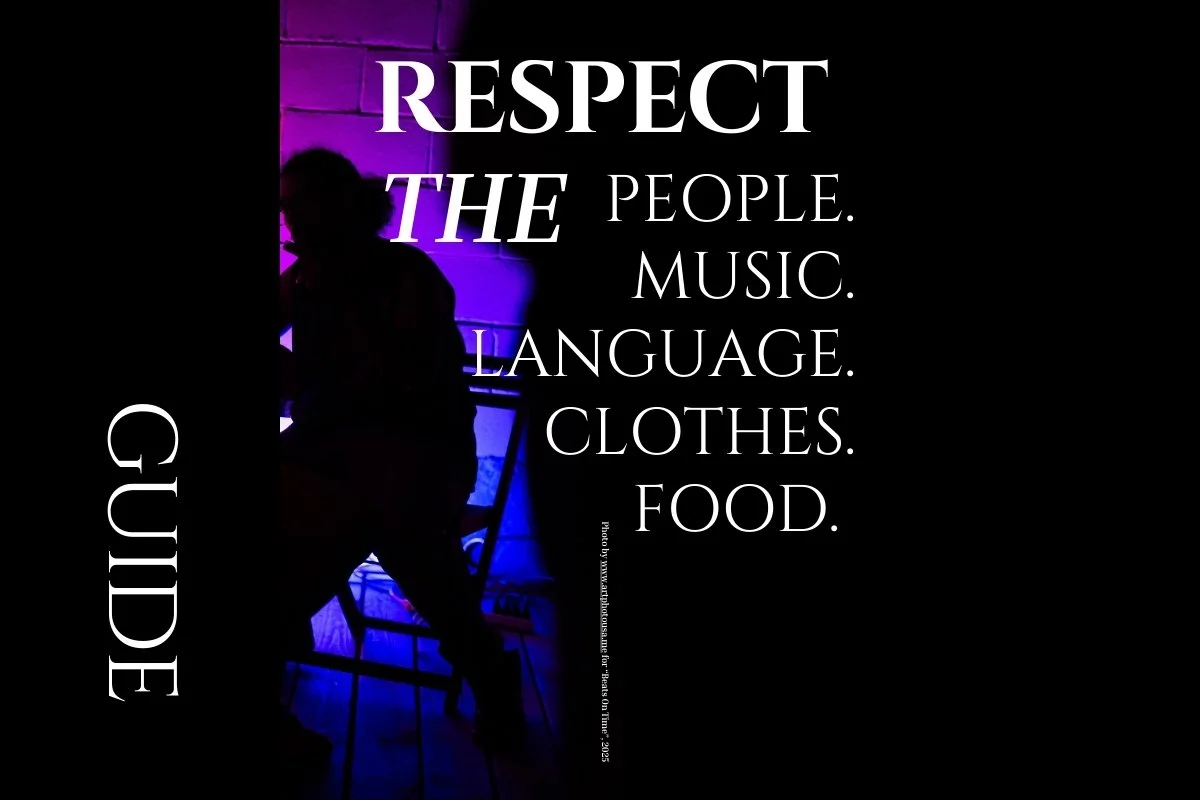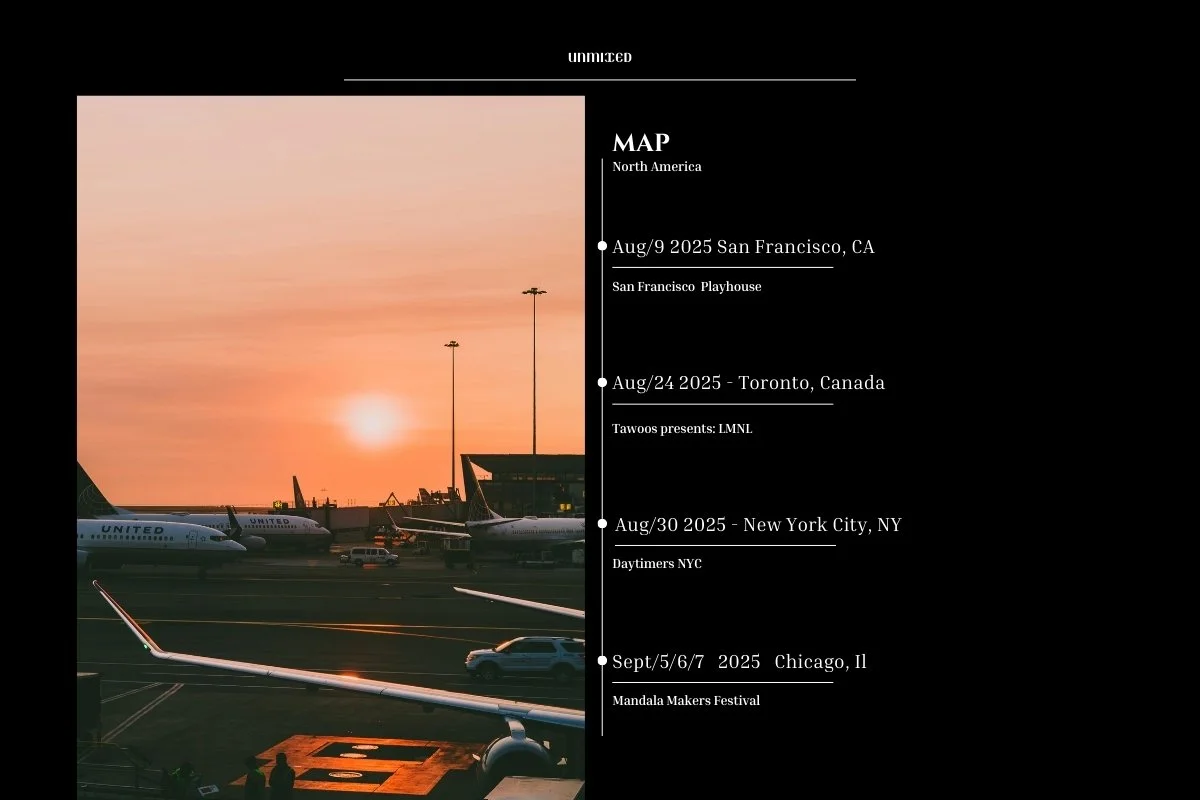South Asians in North America — The Current State (Aug-Sept 2025)
Daytimers NYC - Tawoos: LMNL - Mandala Makers Festival - Playhouse sf
Daytimers NYC - Tawoos: LMNL - Mandala Makers Festival - Playhouse sf
By Nina Katashvili | Unmixed Magazine
Earlier this year, we spoke with New York-based DJ and curator Sana, who unpacked what we called the “politics of presence” in dance music — the pressure to show up, be seen, and still somehow stay invisible. In a recent IG story, she doubled down on the exhaustion of performing identity while trying to push boundaries. “I personally struggle with ‘adapting’ my sets,” she wrote on her Instagram story, “to a more desi crowd and in the past have been a bit drained from doing this.”
Sana’s frustration isn’t about being South Asian — it’s about being flattened into a musical cliché. Her words echo a larger conversation happening across North America, where South Asian artists are building something more complex than visibility: they're building infrastructure.
Born from the spirit of Daytimers UK, Daytimers NYC is a new collective spotlighting South Asian talent in New York’s multi-genre underground. "With a focus on collaboration and curation, it’s a home for DJs, producers, and creatives pushing the culture forward." they shared on their Instagram page on August 5th.
Daytimers NYC is being sparked by Sana and Krithi, NYC-based DJs and co-founders of the chapter. Known for her genre-spanning, percussive club sets and vibrant presence in the Brooklyn underground, Krithi brings not just music curation but deep intentionality to building a scene. Daytimers announced: “As we near our 5th birthday celebrations, we want to highlight the collectives and spaces that are helping us expand. @krithimusic & @soundsofsana will be kickstarting our NYC chapter with their first party at @moodringnyc.”
Less spectacle, more structure. Daytimers is making a durable home for South Asian dance culture in NYC.
Krithi photo by ZAN𝖎 www.instagram.com/thevisualbeanz
Krithi adds: “I see music as a never‑ending evolution for me, and that I'm never too old to pick up a new skill… My own journey into DJing later in life (I'm almost 40) is proof that it's never too late to chase your musical aspirations.”
"Actively supporting BIPOC women, non-binary, and trans DJs in music production is a significant part of my work, driven by the fact that the music industry still remains a very cis-male oriented world. I frequently encounter this imbalance myself when curating playlists for DJ gigs. Despite consciously seeking out their music, the limited number of tracks by non-cis male DJs/producers available underscores the ongoing need for greater visibility. And this is also my way of giving back to the DJ community. Collectives like No Scrubz Worldwide, Kindergarten Records, DAYTIMERS, She.They.DJ and Caotica, and DJs/Producers like PlayPlay, DJ Rekha and Sana (and the list goes on!) have given me a platform to learn and thrive as a DJ, so the least I can do is give back to the DJ community by teaching production skills. Building community and creative confidence is so important to me."
In a Serato interview, she put it simply: “Music technology gave me the confidence to make dance music with Indian percussion without knowing how to play those instruments in the traditional sense.”
Tawoos Initiative & LMNL: Toronto, Canada
Photos by Anandu Radhakrishan, “Tawoos”, www.tawoosinitiative.org/
Across the border, The Tawoos Initiative has spent the past seven years creating some of Toronto’s most radical, community-rooted nights. This year, they launched their inaugural festival, LMNL (pronounced “liminal”) — an intentionally queer, femme-centered, fully self-produced rave featuring global talent like Armana Khan, ARINI, and Lyla, supported by Canadian DJs and dance performances by Idiz and Anoush Ellah.
Pratishtha Kohli, Tawoos’ co-founder, is clear: “Toronto is still a smaller space than New York. There’s a significant lack of spaces for queer and femme South Asians to feel represented — especially with so many parties shutting down that once centered those voices.”
LMNL also brings in a vendor market — South Asian food, artisanal makers, and henna — making culture the infrastructure, not an add-on.
Let’s talk about fully self-produced — and what it means: no label money, no corporate banners, and definitely no mega-investor fingerprints. LMNL is built from scratch, funded and run entirely by a core team of organizers and volunteers who’ve spent years building Toronto’s underground from the inside. “We created LMNL to centre artists who exist between genres and identities… for those who live in the in-betweens of cultures, genres and generations,” says Director Pratishtha Kohli.
Photo by Anandu Radhakrishan, “Tawoos”, www.tawoosinitiative.org/
Unlike corporate-sponsored Pride events that dilute radical politics in exchange for rainbow capitalism, LMNL creates space with and for those often sidelined. “All are welcome — just don’t be an asshole,” Kohli says. It’s an ethos rooted in care, not branding. That stance carries weight in light of Pride Toronto’s pinkwashing controversies, including the exclusion of BLM and pro-Palestinian groups. Tawoos offers an intentional alternative — not just a safer party, but a necessary cultural intervention.
The community response backs it up. One attendee shared: “Tawoos has created such a magical space where being brown and queer feels so natural... they’ve bridged the gap for multiple identities within the brown and queer umbrellas. I’ve felt so free and connected to my community — their thoughtfulness in curating programs is one of their biggest strengths.” Production manager Karen Rajamohan added: “One girl travelled all the way from Burlington to attend our drop-in DJ workshops because she never has to worry about feeling awkward or unwelcome. People have thanked me for creating a space that makes them feel seen and safe.”
Another standout moment? Tawoos’ 2024 Queer Bollywood Prom. One attendee brought their mother as their prom date. Both arrived in lehengas and reclaimed an experience that so many South Asians in North America had to live unauthentically.
From my editorial perspective — you have every reason to be there, even if you’re not brown. Come with reverence, not entitlement. Listen — really listen — to what people of color are saying. Let the music and the moment expand your understanding. Stand with the culture, not in front of it. Support without centering yourself. Let the room breathe, and let the culture speak for itself.
Follow Tawoos on Instagram: www.instagram.com/tawoosinitiative
Chicago’s Mandala Makers Festival expands the map. Just like Tawoos initiative, Mandala Makers is also turning 7 years old this year. the three‑day, multidisciplinary platform runs September 5–7, 2025 at the Athenaeum Center for Thought and Culture (Lakeview). The weekend mixes classical and contemporary dance, folk traditions, Bollywood showcases, live music, and a club night with a healthy portion of free, public programming alongside ticketed events.
The club night on September 5th is featuring Mandala Ensemble, Atish, Saqib, Deadstream and more!
The Midwest has world‑class South Asian communities, but they’re often fragmented across neighborhoods and institutions. Mandala’s answer is infrastructure: a recurring festival that pairs training and performance, bringing emerging South Asian artists as well as well-established ones like Atish and Saqib both-NYC based DJ/producers, and puts them on historic Chicago stages.
At a glance: Friday centers contemporary works and electronic dance music night; Saturday turns to Folk & Bollywood Day (think Punjabi dhol, mass choreographies, and community ensembles); Sunday rounds out with additional concerts and showcases. The point isn’t nostalgia — it’s a living pipeline from tradition to the next generation.
Saqib & his label Beats on Time: Bridging Tradition and Techno
Photo by www.artphotousa.me for “Beats On Time”, 2025
Back in Brooklyn, Saqib — a Pakistani DJ/producer and head of Beats on Time — is bringing his cultural background to the dancefloor in unique ways. His productions use retro Bollywood, Lollywood and eastern instruments that tug on South Asian heartstrings and bring it back, including an official remix of Asha Bhosle’s classic “Dum Maro Dum”, released on Saregama which is India’s oldest and Bollywood' s biggest label.
But Saqib isn’t just playing with nostalgia. He’s creating his own new sound inside contemporary electronic music. One of the best examples of this is his ‘Karachi Rolling’ EP released in September 2024 featuring his unique lyrics and voice. Beats on Time isn’t a “desi” label — it’s an underground indie dance label that happens to be rooted in diasporic truth just as much as it represents the Brooklyn beat scene. It refuses to brand South Asian culture as a genre or accessory. Instead, it lets the music speak — whether that means a tabla loop in a deep house track or a Bollywood vocal chopped into post-club terrain.
West Coast Nodes: Playhouse SF (San Francisco) — Plus a Note on Indo Warehouse
To round out the map, the Bay Area is quietly building real infrastructure too. Play House SF has been running community‑first, South Asian‑led nights that bridge experimental club, house, and diaspora pop without flattening the culture into a gimmick. Their recent REVERB presents: SKYE booking underscores a simple point: there’s audience demand for South Asian curators who guide the dancefloor with taste, not tokenism. In a city where algorithmic nightlife can feel sanitized, Play House SF’s approach brings back risk, warmth, and locality.
Brief Note on Indo Warehouse
And yes, the bigger wave is undeniable. NYC‑born Indo Warehouse has carried South Asian‑infused house/techno into large rooms across North America and the world. For the purposes of this piece, consider them proof that there’s broad, mainstream appetite. Our focus here stays on the DIY and community‑run layer that makes that scale possible in the first place.
Photo by www.artphotousa.me for “Beats On Time”, 2025
How to Show Up Respectfully (short editorial guidance)
Underground has a code. Respect the labor: buy a ticket, be on time. Do not harass women! Read the room. If you’re not South Asian, follow — don’t lead. No “play Bollywood” demands, no clichés, no crowding the booth.Support vendors. Dance on the dancefloor. Uplift queer, femme, and trans voices. Respect the culture. Support the vendors. And most importantly have fun and make core memories.
Photo by www.artphotousa.me for “Beats On Time”, 2025
The Bottom Line
If there’s a throughline between Tawoos, Daytimers, Mandala Makers, Playhouse and Beats On Time, it’s this:
They don’t want to be “tokenized.” They want to be respected.
They’re not asking for more brown nights. They’re building entire infrastructures of their own.
They’re not chasing Western validation. They’re re-rooting global dance culture in traditional rhythms, future-forward thinking, and deeply personal politics.
This isn’t a wave.
It’s a quiet revolution — across North America.
And you can be part of it. Go support the rootgrass of it by showing up at their events — whether you're in Toronto on August 24th, 2025 for LMNL, or in New York for Daytimers NYC on August 30th, 2025 or Chicago on September 5–7, 2025 for the Mandala Makers Festival — and follow Unmixed to stay in the loop.
Keep in touch for more food for thought.
We’re not here to sell you hype — just real conversations.
→ Follow us on IG: @unmixed.magazine


